Tag Archives: School Development
Posted on June 16, 2016 by Sophie Hicks
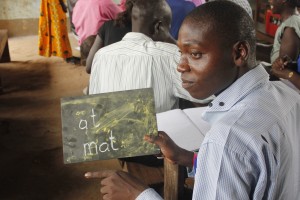 African Revival recently organised a 3- day phonics training for Koch Goma Primary School with phonics trainers Jody Spencer and Akello Catherine. Jody and Catherine used the Fun of Phonics curriculum, which has been adapted by Jody from international phonics programmes to fit the local teaching environment in Uganda. Teachers were trained in a multisensory synthetics phonics approach using actions and song, and practiced using teaching methods such as pair reading.
African Revival recently organised a 3- day phonics training for Koch Goma Primary School with phonics trainers Jody Spencer and Akello Catherine. Jody and Catherine used the Fun of Phonics curriculum, which has been adapted by Jody from international phonics programmes to fit the local teaching environment in Uganda. Teachers were trained in a multisensory synthetics phonics approach using actions and song, and practiced using teaching methods such as pair reading.
But what is phonics? How is it different from teaching children to read using the rote memorization technique? And why is it so effective? Find out all you ever wanted to know about phonics here!
What is phonics?
Phonics is a method of teaching reading and writing that focuses on sounds. In the English language there are only 26 letters in the alphabet, however there are 44 sounds and 120 main ways of writing these sounds. Phonics teaches children to recognise and write these sounds by training them to correlate these different sounds (phonemes) with letters (graphemes).
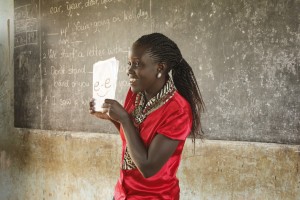 Take an example
Take an example
Phonemes are the smallest units of sound that make up a word.
Take the word ‘star’. While it consists of only one syllable, it contains four different phonemes: /s/ /t/ /a/ /r/. When teaching phonics, children will be taught the sound each phoneme makes, then how to put these sounds together to sound out the whole word.
Some sounds have one letter, while others have two or three. For example, the word ‘fish’ has four letters but only three sounds – the letters ‘sh’ make one sound but are two letters.
Why is phonics an effective teaching method?
A written language is basically a kind of a code. Teaching phonics is just teaching children to crack that code by learning to recognize the sounds of letters and different letter combinations. Children learn the simple bits first and then easily progress to get the hang of the trickier bits. Phonics gives children the skills to decode new words that they have not been taught by sounding them out, therefore equipping them with the skills to read and write independently.
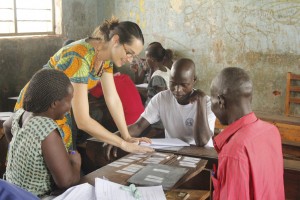 Is phonics effective?
Is phonics effective?
Yes. A study in the UK led by Educational Psychologist Marlynne Grant has shown the effectiveness of phonics instruction at nursery and primary level. The study followed a group of 30 children who were taught using phonics for the first time in nursery, and tracked their progress for three years, to the end of year two in primary school. Grant’s research found that in 2013, members of the year two class of seven-year-olds were on average 28 months ahead of their chronological age for reading and 21 months above their age for spelling.
Why is rote learning not effective?
Rote learning is a memorisation technique centred on repetition and cramming. It is based on the idea that the more a child repeats a piece of information, the quicker they will be able to recall it. However, this quick recall often comes at the expense of a deeper understanding because rote learning does not focus on comprehension.
In Uganda, pupils are often taught English using this rote learning method. Children are taught to repeat and memorize particular sentences and words, but are not taught how to decipher specific sounds in words. This means that some children can read words they have already been taught, but cannot tackle new words on their own. Other children, however, find it difficult to memorize words and can progress through primary school with a limited reading ability. Many children leave primary school without being able to read independently when taught using rote memorization.
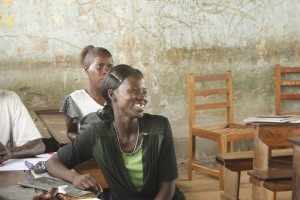 What are literacy levels in Uganda?
What are literacy levels in Uganda?
Across Uganda, one third of youth are illiterate and pass rates for English amongst children aged 10-16 are only 47% (Uwezo). In many schools, especially those in poorer rural areas, quality of education remains poor and teachers lack practical skills and educational resources. Many children leave school without the ability to read simple sentences that they have not already been taught.
Why does literacy matter?
Children’s poor skills in reading and writing have a direct result on their results in other academic subjects such as mathematics and science because the main academic language for exams in primary school is English. Children who cannot read and understand questions for these subjects often perform poorly in exams and do not develop literacy skills vital for success in the workplace and beyond.
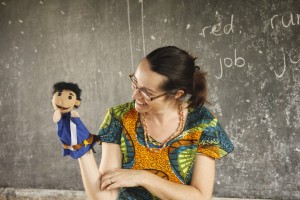 How can training teachers in phonics help improve literacy levels?
How can training teachers in phonics help improve literacy levels?
The root cause of illiteracy is the way teachers are trained in Uganda. In general, they are taught to use rote memorisation to train pupils to read and write, often graduating from Primary Teaching College without being confident in teaching English. In some rural schools, some teachers struggle with the English language themselves following years of poor instruction, so struggle to teach the language in the classroom. Moreover, they lack skills in effective, research-based teaching methods which engage learners. By training teachers in phonics methodology, they will be equipped with the skills to teach children how to decode new words and give them the framework to independently develop their literacy level. Strong literacy skills will help students to improve their performance in other subject areas, with general comprehension across subjects enhanced by the ability to read and write well.
Posted in News |
Tagged African Revival, Changemaker, Development, ECD, Education, Gulu, inspiration, Inspiring Head Teacher, International Development, Jumpstart!, Nursery School, School Development, Teacher training |
Leave a comment
Posted on May 5, 2016 by Sophie Hicks
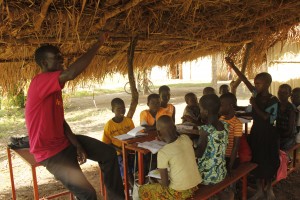 In rural Nwoya district, Northern Uganda, many children are not in school. Some have dropped out – others have never been to school at all. The reasons for dropping out are myriad. Some families do not have enough money to pay the fees for multiple children at school, as well as school uniform and scholastic materials. Other children are required to stay at home to care for sick relatives or help with household chores.
In rural Nwoya district, Northern Uganda, many children are not in school. Some have dropped out – others have never been to school at all. The reasons for dropping out are myriad. Some families do not have enough money to pay the fees for multiple children at school, as well as school uniform and scholastic materials. Other children are required to stay at home to care for sick relatives or help with household chores.
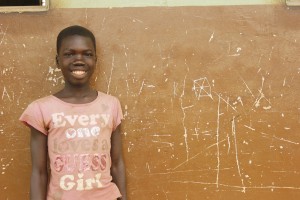 Molly (right) is one young girl who, at 13 years old, had never been to school until she enrolled in Speed School. Her uncle, who she lives with, did not allow her to go to school; instead she stayed at home to do most of the cooking and cleaning. And hers is not an isolated case. Sarah, also 13, had to drop out of school when her father spent all the money meant for school fees on the bride price for Sarah’s step mother. Paying dowry is still a tradition in northern Uganda and often impoverishes families. After the money had been used on his new bride, Sarah’s father asked her and her 4 siblings to stay at home until he found the money for their education. 3 are now enrolled in Speed School, which is a free initiative.
Molly (right) is one young girl who, at 13 years old, had never been to school until she enrolled in Speed School. Her uncle, who she lives with, did not allow her to go to school; instead she stayed at home to do most of the cooking and cleaning. And hers is not an isolated case. Sarah, also 13, had to drop out of school when her father spent all the money meant for school fees on the bride price for Sarah’s step mother. Paying dowry is still a tradition in northern Uganda and often impoverishes families. After the money had been used on his new bride, Sarah’s father asked her and her 4 siblings to stay at home until he found the money for their education. 3 are now enrolled in Speed School, which is a free initiative.
The reasons why children have dropped out of school are complex and difficult to address. But now a new initiative called Speed School, implemented by African Revival in partnership with Geneva Global, is aiming to get these drop outs back into school. The Speed School programme was previously implemented by Geneva Global in Ethiopia. The project was such a success that it was brought to Uganda and adapted to the national education system. African Revival is now managing 30 Speed School classes, each with 25 pupils. Over one year, we aim to educate and reintroduce 750 pupils into mainstream education and address the root causes of primary school drop outs and absenteeism.
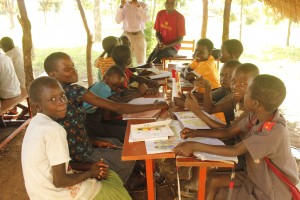 Speed School is an accelerated learning programme which will teach children the first 3 years of the primary curriculum, after which they will re-join the formal education system in Grade 4. Children are taught using effective participatory and child-centred learning methods which the Speed School teachers (called facilitators) learned during an intensive training session at the start of the project. The facilitators are also taught different ways to lesson plan, make learning aids, and encouraged to place an emphasis on critical thinking skills in class. Reduced class sizes of 25 pupils (the average teacher-pupil ratio in government schools is 1:80) also makes classes easier to manage and improves behaviour and pupil motivation. Moreover, the facilitators are from the local community, so as well as teaching the condensed curriculum, they can also monitor their pupils to ensure that they stay in Speed School and do not drop out again.
Speed School is an accelerated learning programme which will teach children the first 3 years of the primary curriculum, after which they will re-join the formal education system in Grade 4. Children are taught using effective participatory and child-centred learning methods which the Speed School teachers (called facilitators) learned during an intensive training session at the start of the project. The facilitators are also taught different ways to lesson plan, make learning aids, and encouraged to place an emphasis on critical thinking skills in class. Reduced class sizes of 25 pupils (the average teacher-pupil ratio in government schools is 1:80) also makes classes easier to manage and improves behaviour and pupil motivation. Moreover, the facilitators are from the local community, so as well as teaching the condensed curriculum, they can also monitor their pupils to ensure that they stay in Speed School and do not drop out again.
As well as Speed School classes, Geneva Global have also established self-help groups for the parents of the enrolled pupils. In these groups parents – primarily mothers – will be trained in Income Generating Activities to economically empower them so they are able to meet the financial demands of educating their children. These activities may include Village Savings and Loans Associations (VSLA), agriculture or business activities.
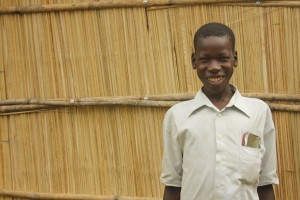 By ensuring the parents are empowered economically, the Speed School programme aims to address one of the main reasons why children dropped out of school in the first place: lack of money for school fees. Even if parents want their children to gain an education, school is not always a priority. Richard, a bright-eyed 13 year-old, dropped out of school in 2012 because both of his parents had died. He now lives with his grandmother, and has a hand-to-mouth existence: his grandmother is frail and can only generate enough money to feed Richard. No money is left for school fees. But now Speed School is helping Richard to study again and get an education, so one day he can achieve his dream of becoming a pilot: “I want to be a pilot so I can move in different places, and learning ways of living and different cultures”. Motivated and focus, we are sure Richard, along with the other children in Speed School, will excel this year in this supportive programme and go on to succeed in the future.
By ensuring the parents are empowered economically, the Speed School programme aims to address one of the main reasons why children dropped out of school in the first place: lack of money for school fees. Even if parents want their children to gain an education, school is not always a priority. Richard, a bright-eyed 13 year-old, dropped out of school in 2012 because both of his parents had died. He now lives with his grandmother, and has a hand-to-mouth existence: his grandmother is frail and can only generate enough money to feed Richard. No money is left for school fees. But now Speed School is helping Richard to study again and get an education, so one day he can achieve his dream of becoming a pilot: “I want to be a pilot so I can move in different places, and learning ways of living and different cultures”. Motivated and focus, we are sure Richard, along with the other children in Speed School, will excel this year in this supportive programme and go on to succeed in the future.
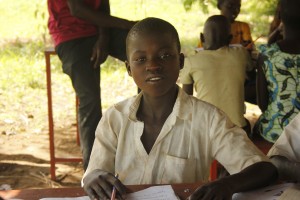
Posted in News |
Tagged Acholi, African Revival, Changemaker, Education, Gulu, Headteacher, inspiration, Inspiring Head Teacher, International Development, Lord's Resistance Army, Northern Uganda, Nursery School, School Development, Teacher training |
Leave a comment
Posted on April 11, 2016 by Sophie Hicks
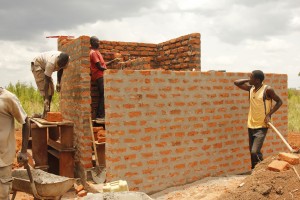 At African Revival, we always ask the communities who benefit from our construction projects to make a contribution. This can be either financial or in the form of labour and resources. But why ask for this contribution? Why is it important for the success of the project? In this article, we explore the benefits of community contribution and ask Construction Coordinator Vincent about what motivates parents to contribute.
At African Revival, we always ask the communities who benefit from our construction projects to make a contribution. This can be either financial or in the form of labour and resources. But why ask for this contribution? Why is it important for the success of the project? In this article, we explore the benefits of community contribution and ask Construction Coordinator Vincent about what motivates parents to contribute.
When an outside organisation comes into a rural community to work on a construction project, there is a risk that the community members see the building as belonging to an outside agency. Often this means that they do not have a feeling of responsibility towards it and in many cases do not properly maintain it. They see this as the duty of the outside organisation. This can mean construction projects fall into disrepair and are not sustainable in the long term.
In order for the community to properly maintain a building, they must feel some sense of ownership towards it. Community contribution of money, labour or resources can help generate this sense of ownership and make a project more sustainable, as Construction Coordinator Vincent explains: “If the community make a contribution, the sense of ownership gets into them. In most interventions that have been going on in the construction industry, we realise that after a while the community still doesn’t own the place, even if you hand over officially to them. So we want them to own the latrine, right from the onset”
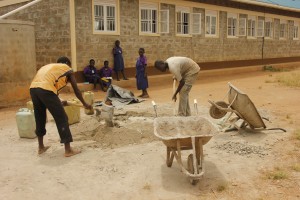 This sense of ownership can be generated by involving the community members right from the start, by consulting them about their real needs, involving them in the planning process and asking them what they can realistically contribute. A community in a rural setting may want to contribute building materials sourced from the local environment, which costs them nothing, while a town-based community may not have access to natural building materials and may choose instead to contribute in cash. Whatever the contribution, it encourages a sense of duty and pride towards the new facility, as Vincent describes: “If they contribute, the community feels more ownership than when someone just gives it to them. So that means if the facilities are completed they will take care of it. They will try to see that nobody messes it up. If there is any burglary, they are willing to take care of the security. They rejoice at the end of the day that this is their labour, their contribution. They feel proud that they have contributed for the construction of a classroom, now their children are able to use the facility”
This sense of ownership can be generated by involving the community members right from the start, by consulting them about their real needs, involving them in the planning process and asking them what they can realistically contribute. A community in a rural setting may want to contribute building materials sourced from the local environment, which costs them nothing, while a town-based community may not have access to natural building materials and may choose instead to contribute in cash. Whatever the contribution, it encourages a sense of duty and pride towards the new facility, as Vincent describes: “If they contribute, the community feels more ownership than when someone just gives it to them. So that means if the facilities are completed they will take care of it. They will try to see that nobody messes it up. If there is any burglary, they are willing to take care of the security. They rejoice at the end of the day that this is their labour, their contribution. They feel proud that they have contributed for the construction of a classroom, now their children are able to use the facility”
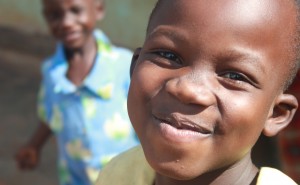 Voluntary provision of labour, time, money and materials can also help to break patterns of dependency and passivity. If the community knows that in order to benefit from a construction project, they will also need to contribute, this can help to counteract a hand-out culture inspired by decades of free projects and facilities. Involving a community in the planning and implementation process can also empower individuals by giving them decision-making power over their own futures, as well as imparting new knowledge and skills – for instance knowledge about proper planning or new construction skills. All these factors contribute to the long term sustainability of the project by encouraging responsibility amongst the community and giving them the skills they need to properly maintain a construction project.
Voluntary provision of labour, time, money and materials can also help to break patterns of dependency and passivity. If the community knows that in order to benefit from a construction project, they will also need to contribute, this can help to counteract a hand-out culture inspired by decades of free projects and facilities. Involving a community in the planning and implementation process can also empower individuals by giving them decision-making power over their own futures, as well as imparting new knowledge and skills – for instance knowledge about proper planning or new construction skills. All these factors contribute to the long term sustainability of the project by encouraging responsibility amongst the community and giving them the skills they need to properly maintain a construction project.
But what motivates a community to contribute? According to Vincent, it is a desire to see the best for all the members of that community, and in the case of school construction projects, a better future for their children:“Some may want their children to be in a safe environment. If the environment is good, that means the education is better. Most importantly, it is about the future of the children who attend the school. The community want to see a child have a better future. If there is anything that they can do, like development fees, like personal labour – that is the driving force that makes community members give contributions”
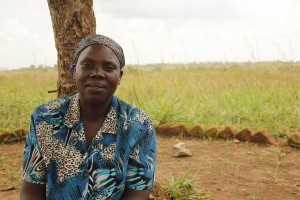 Community member Christine, a parent at Teddi Community School where African Revival recently constructed a new block of latrines, agrees: “We don’t contribute because of a penalty or a demand. We contribute because we want to see this school and community development and want to be part of that process.” At Teddi, the parents contributed 1000UGX for each of their children enrolled at the school. They also signed a maintenance agreement with African Revival, which hands over responsibility for all upkeep to the School Management Committee. While we will always be there to offer support to this particular community, they are motivated to care for the facility because it has improved sanitation at the school, especially for the female pupils, as parent Sharon explains: “I was happy to contribute to the latrine. Now our girls have more privacy”.
Community member Christine, a parent at Teddi Community School where African Revival recently constructed a new block of latrines, agrees: “We don’t contribute because of a penalty or a demand. We contribute because we want to see this school and community development and want to be part of that process.” At Teddi, the parents contributed 1000UGX for each of their children enrolled at the school. They also signed a maintenance agreement with African Revival, which hands over responsibility for all upkeep to the School Management Committee. While we will always be there to offer support to this particular community, they are motivated to care for the facility because it has improved sanitation at the school, especially for the female pupils, as parent Sharon explains: “I was happy to contribute to the latrine. Now our girls have more privacy”.
Overall, community contribution to construction projects ensures the long term sustainability of that project, while also giving communities more authority over their own development and futures.
Posted in News |
Tagged African Revival, community contribution, community development, Development, Education, Gulu, inspiration, International Development, Lord's Resistance Army, School Development, Teacher training |
Leave a comment
Posted on February 23, 2016 by Sophie Hicks
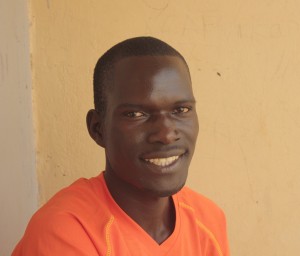
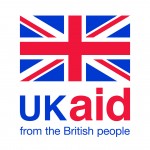
Sunday is only 22 years old, yet already he is the headteacher of Lacek Community School in Nwoya district! To hold such an important position at such a young age is testimony to both his considerable talents as a teacher and to how highly he is considered in the surrounding community. But Sunday is not just a Headteacher. He is also participating in the Teacher Changemaker network, which we coordinate in partnership with STIR Education in Northern Uganda! So far, Sunday has implemented an incredibly successful Village Savings and Loans Association in Lacek School (they have saved an impressive 3,775,400 since May) which is also helping to bring parents closer to the school to monitor their children’s education, improving student motivation and performance. Read on to discover how Sunday is changing the way the local community views education and impacting on the next generation at Lacek Community School!
My parents were escaping from the Lord’s Resistence Army, so I was born in Gulu. But our original homeland is in Kinene. We moved back to Kinene in 2006 when the war ended. I was 13 years old. I have only 3 brothers without any girls. My mother gave birth to 4 girls but they all passed away. There were only 4 boys left. I have four half brothers and sisters from my fathers second wife. We all live together in Kinene. My father had many wives, almost 11. He is 80 years old now.
Teaching became interesting to me because of a certain teacher in my primary, called Mr Laloo. That teacher really made me who I am. I struggled to learn English, so he put a lot of work into teaching me how to speak and write well. I liked the way he taught me, and I promised to myself I would become a teacher.
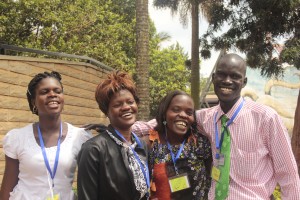 Being part of the Teacher Changemaker network made me realise that the problem in our schools is parent engagement. It touches me. There is a lack of parent engagement in these communities – parents have very negative attitudes towards education. I saw that many were not able to pay their children in school. I sat down with the School Management Committees and asked, which is the best way we can help these parents? I decided to bring the Village Savings and Loans Association (VSLA), which other localities are doing successfully. When they save money for 2 months, that money alone is able to pay the school fees for their children. So I decided to mobilize parents. Many parents joined me. Every week they come and save their money in the pool. So far they have saved 3,775,400 (since May 2015).
Being part of the Teacher Changemaker network made me realise that the problem in our schools is parent engagement. It touches me. There is a lack of parent engagement in these communities – parents have very negative attitudes towards education. I saw that many were not able to pay their children in school. I sat down with the School Management Committees and asked, which is the best way we can help these parents? I decided to bring the Village Savings and Loans Association (VSLA), which other localities are doing successfully. When they save money for 2 months, that money alone is able to pay the school fees for their children. So I decided to mobilize parents. Many parents joined me. Every week they come and save their money in the pool. So far they have saved 3,775,400 (since May 2015).
Children are getting benefits from their parents being in the VSLA. Their parents can borrow money and pay them, buy for them uniform, the scholastic materials. Also, the parents are able to monitor their children, whether they are in the class, whether they are learning. They first move around all the school compound checking what is wrong, what is good, and they feedback later.
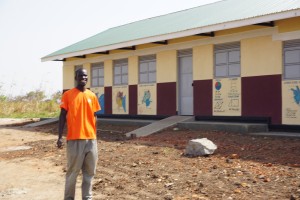 In our culture, when you are a teacher, people prefer to be like you, because teachers are able to make unknown known. So people take teachers as the most important thing for the community. The change makers. Whenever there are any problems they first consult the teacher. During village meetings, I am always the chief’s guest when they are making bylaws. I help them to decide which ways to manage the schools and build the community. And when we are making school rules, we invite the chiefs to help. So when the child is not at school, we can give a phone call to the chief to inform him about the problem within his area of service.
In our culture, when you are a teacher, people prefer to be like you, because teachers are able to make unknown known. So people take teachers as the most important thing for the community. The change makers. Whenever there are any problems they first consult the teacher. During village meetings, I am always the chief’s guest when they are making bylaws. I help them to decide which ways to manage the schools and build the community. And when we are making school rules, we invite the chiefs to help. So when the child is not at school, we can give a phone call to the chief to inform him about the problem within his area of service.
I am getting some great advice from the network, like its OK to make mistakes. For us we take mistakes as a very bad thing. When we make mistakes in the Ugandan education system, people do not like it. But when I see anyone making mistakes, I just help them, and do not tell them off. The network always tells us that through mistakes, you can learn.
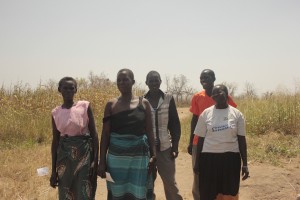 The part of the network that has motivated me a lot is friendship. Before, I didn’t know any of the other teachers in Nwoya district who are now in the network. I speak with my friend Gino (a pre-primary teacher at Purongo Hill Primary School) by phone almost daily. We just call each other and share the things from our day.
The part of the network that has motivated me a lot is friendship. Before, I didn’t know any of the other teachers in Nwoya district who are now in the network. I speak with my friend Gino (a pre-primary teacher at Purongo Hill Primary School) by phone almost daily. We just call each other and share the things from our day.
In the future, after going for my ECD diploma, I’m hoping to be a tutor and train teachers in Early Childhood Development. I can see myself so much specialised in the ECD because I understand young children’s behaviour.
My daughter, she is very stubborn! She is around 2 years old. At around 1 ½ years, she was also able to speak. She acquired language very early. I play with her everyday, even if she is not understanding everything I say. She is called Akello Charity Hope. She loves playing, she plays so much. When I reach home in the evening, we sing songs together. I will arrive and she will immediately come to me to sing songs, to speak funny things. In the future I want her to be like me – a teacher.
Posted in News |
Tagged Acholi, African Revival, Changemaker, Development, ECD, Education, endurance, Gulu, Headteacher, inspiration, International Development, Interview, Jumpstart!, Kampala, Nursery, Nursery School, Profile, Pupils, School, School Development, STIREducation, Teacher training, Uganda, World Teachers' Day |
Leave a comment
Posted on February 17, 2016 by Sophie Hicks
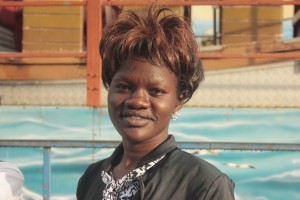

Irene started her early career as a tap dancer. Trained for a year by a man from California named Jack, she still has a real passion for the dance with ‘the glass shoes’. Now an Early Childhood Development teacher in Anaka P7 Primary School in Nwoya district, Northern Uganda, she regularly brings song and dance into her lessons as a way of energising her pupils and bringing her classroom alive. This interactive style of teaching is just one of the things she has learned from participating in Teacher Changemaker network, implemented by STIR Education and coordinated in Nwoya district by African Revival.
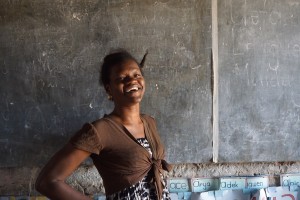 The Teacher Changemaker network encourages teachers across Uganda to introduce ‘micro innovations’, new techniques to increase the quality of education, into their lessons to respond to the challenges they face in the Ugandan education system. For Irene and her colleagues at Anaka P7, one of the main challenges is lack of parental engagement: “We decided that parental engagement is the biggest problem affecting our school. There are parents that, when you call them for a meeting, they don’t want to come. They don’t provide the scholastic materials for their children. You find a child will come to school hungry, without having eaten, and not be able to concentrate in class. Children like this end up failing.” She and her fellow teachers have introduced a procedure to counteract this challenge: “The first step is to call the parents for a meeting. The second stage is to go up to the home to see what is the problem stopping this child from performing. And the time comes when the parents start to listen, slowly, until they are now following the advice of the teacher. We have used this procedure and now there are many who come to check the progress of the children”. This micro innovation is already having positive results. This year, more children in Irene’s class passed, and she has noticed a change in the attitude of her students in class, now their parents are taking more of an interest in their education.
The Teacher Changemaker network encourages teachers across Uganda to introduce ‘micro innovations’, new techniques to increase the quality of education, into their lessons to respond to the challenges they face in the Ugandan education system. For Irene and her colleagues at Anaka P7, one of the main challenges is lack of parental engagement: “We decided that parental engagement is the biggest problem affecting our school. There are parents that, when you call them for a meeting, they don’t want to come. They don’t provide the scholastic materials for their children. You find a child will come to school hungry, without having eaten, and not be able to concentrate in class. Children like this end up failing.” She and her fellow teachers have introduced a procedure to counteract this challenge: “The first step is to call the parents for a meeting. The second stage is to go up to the home to see what is the problem stopping this child from performing. And the time comes when the parents start to listen, slowly, until they are now following the advice of the teacher. We have used this procedure and now there are many who come to check the progress of the children”. This micro innovation is already having positive results. This year, more children in Irene’s class passed, and she has noticed a change in the attitude of her students in class, now their parents are taking more of an interest in their education.
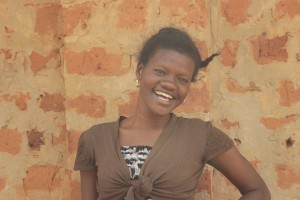 Irene is confident that the innovations and increased focus on critical analysis and problem solving that the Changemaker network has facilitated will continue to have a positive impact on her primary school: “as long as we keep innovations coming to Anaka p7, there will be a great many positive changes. Though we have some parents who don’t listen to the school, in time there will be a lot of improvements because us teachers have learned ways of solving the problems we face”
Irene is confident that the innovations and increased focus on critical analysis and problem solving that the Changemaker network has facilitated will continue to have a positive impact on her primary school: “as long as we keep innovations coming to Anaka p7, there will be a great many positive changes. Though we have some parents who don’t listen to the school, in time there will be a lot of improvements because us teachers have learned ways of solving the problems we face”
The network is also having a positive impact on Irene’s confidence and motivation as a teacher: “The network taught me that, if you are a teacher, you should have confidence in everything you do, you should be exemplary, you should have knowledge, you should be someone who searches for things that will make a change. Someone creative in the mind who will search for ways to make the children learn well and pass”.
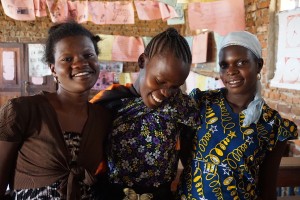 She also enjoys the unity and collaboration with the other Teacher Changemakers, which is a real advantage for all participants. Teaching in any part of the world can be a difficult job, and in Uganda the lack of good infrastructure, teaching materials and training exacerbates the already considerable challenges. By encouraging teachers to share and support each other, the Teacher Changemaker network is looking to alleviate these challenges through an informal support system that allows participants to vocalise their problems and search for solutions together. This style of network also means that innovations produced by the teachers are tailored to the specific localised environments across Uganda, rather than ready-made solutions designed out of context. This contributes to the success of the network and its popularity amongst its Changemakers, especially Irene, who advised teachers to try out the new Changemaker innovations for themselves: “My advice for other teachers is this: go and put the micro innovations into use, because they will help a lot. And help you learn how to communicate with others, discuss, be social and cooperative and many others. When you go back to school tell others to do the same!”
She also enjoys the unity and collaboration with the other Teacher Changemakers, which is a real advantage for all participants. Teaching in any part of the world can be a difficult job, and in Uganda the lack of good infrastructure, teaching materials and training exacerbates the already considerable challenges. By encouraging teachers to share and support each other, the Teacher Changemaker network is looking to alleviate these challenges through an informal support system that allows participants to vocalise their problems and search for solutions together. This style of network also means that innovations produced by the teachers are tailored to the specific localised environments across Uganda, rather than ready-made solutions designed out of context. This contributes to the success of the network and its popularity amongst its Changemakers, especially Irene, who advised teachers to try out the new Changemaker innovations for themselves: “My advice for other teachers is this: go and put the micro innovations into use, because they will help a lot. And help you learn how to communicate with others, discuss, be social and cooperative and many others. When you go back to school tell others to do the same!”
Posted in News |
Tagged Acholi, African Revival, Changemaker, Development, ECD, Education, inspiration, International Development, Jumpstart!, Kampala, Kilimanjaro, Nursery, Nursery School, Profile, Pupils, School, School Development, STIREducation, Teacher, Teacher training, Uganda |
Leave a comment
Posted on February 11, 2016 by Sophie Hicks
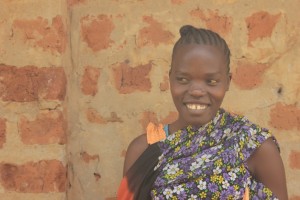 Kevin, aged 23, is a primary teacher from Anaka P7 Primary School, and a fantastic Teacher Changemaker! She is participating in STIR Education’s Teacher Changemaker network, which is designed for teachers to share ideas and innovations, as well as to provide a source of motivation for educators in what can be a difficult working environment. African Revival’s Jumpstart! team has been helping STIR to manage the network in Nwoya district, where we caught up with Kevin to find out how the Changemaker network is benefitting her and her students!
Kevin, aged 23, is a primary teacher from Anaka P7 Primary School, and a fantastic Teacher Changemaker! She is participating in STIR Education’s Teacher Changemaker network, which is designed for teachers to share ideas and innovations, as well as to provide a source of motivation for educators in what can be a difficult working environment. African Revival’s Jumpstart! team has been helping STIR to manage the network in Nwoya district, where we caught up with Kevin to find out how the Changemaker network is benefitting her and her students!
I teach in the primary section of Anaka P7. I like the lower primary classes because they are young and friendly, so I enjoy interacting with them. The Teacher Changemaker network has given me a lot of methods about how to handle children, especially children with behavioural problems. It has given me more skills to handle the stubborn ones, the latecomers, and others with different problems.
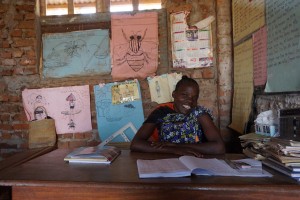 The best thing about being part of the Teacher Changemaker network is that we meet many Changemakers who give us many new skills. I have learnt the qualities of a good teacher, how to handle the classroom situation and how to make the classroom into a good learning environment.
The best thing about being part of the Teacher Changemaker network is that we meet many Changemakers who give us many new skills. I have learnt the qualities of a good teacher, how to handle the classroom situation and how to make the classroom into a good learning environment.
Being a Changemaker means being a teacher who is an all rounder, being a teacher who has a growth mind-set not a fixed mind-set and a teacher who is always ready for anything. As a Changemaker, you have to practice what you preach. You have to be innovative, influential, creative and motivate the learners.
This year I will use one micro innovation that I call ‘I do, we do, you do’. I will first do on my own as the learners watch and learn from me. Then ‘we do’ together. Then ‘you do’ – one particular learner will do as I observe and correct the work. We had some training about this. I’ve tried it before and it always works very well. Even during our teacher training, we do the exercises like this and it’s a nice technique.
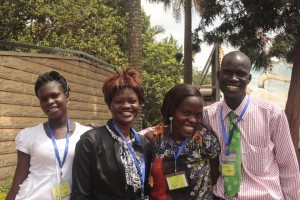 Since being involved in the Teacher Changemaker network, I have one success story about a child who didn’t enjoy learning. The child came from a long distance away, so the problem was lack of lunch, because at school we don’t provide food for the learners. I decided to talk to the parents of the child to make a plan. I started by advising them that in life there is mostly one thing: if the stomach is full, the brain will be open to learning new things, but if the stomach is complaining, the brain is focused on the stomach. The parents followed my advice and sent the child to school with packed lunch. Soon after, the learning behaviour of the child changed – they came to school early and concentrated in class. When the year ended last year, the child passed very well. After I saw the positive progress of the child, I told my fellow Changemakers in my school about the procedure I had used.
Since being involved in the Teacher Changemaker network, I have one success story about a child who didn’t enjoy learning. The child came from a long distance away, so the problem was lack of lunch, because at school we don’t provide food for the learners. I decided to talk to the parents of the child to make a plan. I started by advising them that in life there is mostly one thing: if the stomach is full, the brain will be open to learning new things, but if the stomach is complaining, the brain is focused on the stomach. The parents followed my advice and sent the child to school with packed lunch. Soon after, the learning behaviour of the child changed – they came to school early and concentrated in class. When the year ended last year, the child passed very well. After I saw the positive progress of the child, I told my fellow Changemakers in my school about the procedure I had used.
The happiest moment I have ever had is when I graduated from teaching college. I found that during my school practice I got an A! I celebrated this moment, because it’s the moment I became a qualified teacher.
I want to go to the next level of education. I want to do a degree in primary education. If I can, I’ll try East African International University in Kampala where this year’s STIR Education summit was held. I will work very hard to achieve this goal.
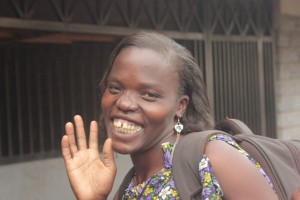 My role model is my dad because he is a teacher, so I’ve also decided to take his profession. He is a head teacher in St.Luke’s Primary School in Nwoya district. I always look at what he does and admire him because he is funny, friendly and nice.
My role model is my dad because he is a teacher, so I’ve also decided to take his profession. He is a head teacher in St.Luke’s Primary School in Nwoya district. I always look at what he does and admire him because he is funny, friendly and nice.
If I could give one piece of advice to a group of people it would be to be comfortable with change. They should not be static. If change comes, they should be open to new things. Like if a new teaching innovation is introduced we should embrace it.
Posted in News |
Tagged African Revival, Changemaker, Development, ECD, Education, Gulu, inspiration, International Development, Jumpstart!, Kampala, Nursery School, School Development, STIREducation, Teacher, Teacher training, Uganda |
Leave a comment
Posted on November 18, 2015 by Sophie Hicks
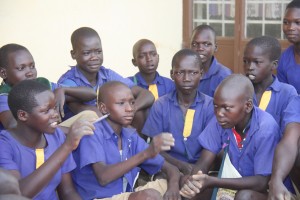 Pupils’ entrepreneurship clubs have also now been established in all 15 schools that African Revival works with through the School Demonstration Garden Project. There are 50 members with equal number of boys and girls in each school. The club members have elected their leaders and are being guided by a teacher from each school. Having selected their crops to plant, which will form their micro enterprises, members are now undergoing training on business planning and management using the School Enterprise Challenge methodology by Teach A Man to Fish. These newly acquired business skills are to be implemented within their school garden project. This practical application will serve as a unique and useful experience for these pupils, equipping them with the skills to flourish in the business of farming, leading to increased professional stability when they leave school.
Pupils’ entrepreneurship clubs have also now been established in all 15 schools that African Revival works with through the School Demonstration Garden Project. There are 50 members with equal number of boys and girls in each school. The club members have elected their leaders and are being guided by a teacher from each school. Having selected their crops to plant, which will form their micro enterprises, members are now undergoing training on business planning and management using the School Enterprise Challenge methodology by Teach A Man to Fish. These newly acquired business skills are to be implemented within their school garden project. This practical application will serve as a unique and useful experience for these pupils, equipping them with the skills to flourish in the business of farming, leading to increased professional stability when they leave school.
Otwe Pupils’ Entrepreneurship Club
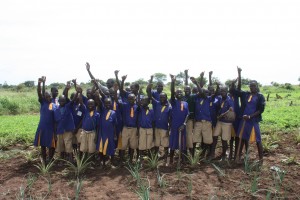
The Otwe Primary SDG Pupils’ Entrepreneurship club is in high spirits. The bean crop that they planted back in March is doing very well, despite a prolonged drought and damage from stray animals. The rain has at last come, and the pupils are seeing the bountiful effects of their hard work. Soon they hope to harvest and have already started to scout out surrounding villages and towns to assess market potential and decide which marketplace will bring them the highest profit. Head of Marketing, Boniface Rubanga, explained in more detail how the club chooses where to sell:
“Me and the marketing team go to the market and ask for the middle man, and if we think that place can fit in our needs, we can choose that middle man to take the produce.
We prefer selling our things in kilos because with these cup things they can cheat you. For Kilos, you can weigh from here and you can easily come to market and know what you are going to get.”
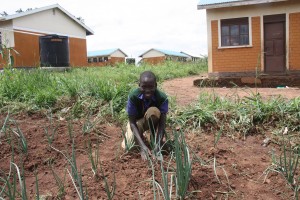 The club has recently received training in marketing skills to support them in this aspect of the project. African Revival Project Officer Babra notes that one of the principle objectives is to enable them to be self-reliant in the future:
The club has recently received training in marketing skills to support them in this aspect of the project. African Revival Project Officer Babra notes that one of the principle objectives is to enable them to be self-reliant in the future:
“We actually train them on how to produce, how to invest, how to add value to the products and how to market it […] our schools are located in the rural areas where the major activities are actually farming but the pupils have realized that the actual challenge faced is the marketing strategy.”
The skills transferred through the Pupil’s Entrepreneurship Club are helping to fill this gap in knowledge and ensure that pupils can effectively handle the post-production and financial aspect of farming.
And some of them already have interesting plans for how they will use the profits from the bean crop, a portion of which will be shared amongst group members (the rest will be added to the group account for future activities). Boniface wants to save his cut with the help of his mother, who is in the Parents’ VSLA group:
“I am in p6 and next year I am in p7. With these savings, it’s going to help me to buy some text books to help me prepare for the national examinations.”
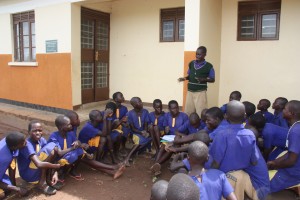 While Boniface has ambitions to become a vicar when he leaves school, he also intends to keep on farming alongside this profession in order to provide his household with a secure source of nutrition, and generate a profit through selling the surplus. As such, the business skills he is learning through the Pupils’ Entrepreneurship Club will continue to serve him well in the future.
While Boniface has ambitions to become a vicar when he leaves school, he also intends to keep on farming alongside this profession in order to provide his household with a secure source of nutrition, and generate a profit through selling the surplus. As such, the business skills he is learning through the Pupils’ Entrepreneurship Club will continue to serve him well in the future.
Posted in News |
Tagged Development, Gulu, School Development, School garden, Uganda |
Leave a comment
Posted on November 12, 2015 by Sophie Hicks
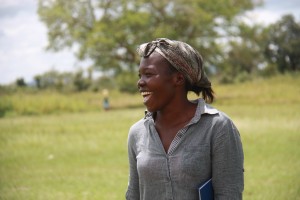 Babra Akello, aged 27, Is African Revival’s Agricultural Project Officer. Originally from Lira, she moved to Gulu together with her husband, with whom she has four year-old twins Jemimmah and Jesse. Babra completed a Certificate in General Agriculture at Busitema University in Soroti district, and is now studying part time for her degree in Agriculture at Uganda Martys University. After roles with the International Institute of Rural Reconstruction and Action Against Hunger, she joined African Revival in January 2012 as an Agricultural Extension Worker, before being promoted to Agricultural Project Officer. Here, Babra tells us more about her role with AR and her long-standing passion for farming.
Babra Akello, aged 27, Is African Revival’s Agricultural Project Officer. Originally from Lira, she moved to Gulu together with her husband, with whom she has four year-old twins Jemimmah and Jesse. Babra completed a Certificate in General Agriculture at Busitema University in Soroti district, and is now studying part time for her degree in Agriculture at Uganda Martys University. After roles with the International Institute of Rural Reconstruction and Action Against Hunger, she joined African Revival in January 2012 as an Agricultural Extension Worker, before being promoted to Agricultural Project Officer. Here, Babra tells us more about her role with AR and her long-standing passion for farming.
In my degree in agriculture I’m learning a lot. For example, the aspects of agricultural development, sustainable management of resources and different techniques of growing crops and handling animals. It’s a broad course.
My responsibilities as Agricultural Project Officer are to ensure that I directly implement African Revival’s project with the beneficiaries in the schools that we work with and to offer trainings in agricultural practices, VSLA and business skills. And also I do represent AR at a parish level, district level and country level. Now, I am implementing the school demonstration garden in 8 schools in Amuru district, so ensuring that all the good agricultural practices are taught and ensuring that what I am training the beneficiaries, they are also learning and replicating at the household level. And with the pupil’s clubs, ensuring that they are taught business models so that they can be well acquainted with the life after school, so that in case they don’t continue with their studies they can be self-reliant and not dependent on their parents.
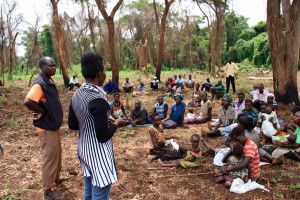 I have done many vocational trainings while working for African Revival and other organisations. I underwent defensive motorbike training. This is more of a safety thing, when you are riding, what you should observe, and actually how to overcome some of the faults or breakdowns in the motorcycle, so you can fix them without taking them to the mechanics. Just to keep you safe when you are driving.
I have done many vocational trainings while working for African Revival and other organisations. I underwent defensive motorbike training. This is more of a safety thing, when you are riding, what you should observe, and actually how to overcome some of the faults or breakdowns in the motorcycle, so you can fix them without taking them to the mechanics. Just to keep you safe when you are driving.
During my free time I like interacting with the children. With my own, but even with other children. The children like me even if I reach home you may not even understand who is my child or who is not my child because every time I am surrounded by children so I just enjoy interacting with them in my free time. The children collect their homework and I actually help them because as a parent, you should guide them. Where we live, there are many children and they are going in the same school, and they converge together and we do it together.
Being a child-centred person, I so much enjoy working with the children involved in the SDG Pupil’s Entrepreneurship Club. I just enjoy focusing on the future of the children. And the other thing I enjoy most is also working with the community that African Revival works with. It is not easy in the north to find parents in the school, but what I like most about our project is that it brings the parents closer to the school, and makes them know the benefit of education. Children can’t move forward without the support of their parents, so therefore African Revival having their projects bring parents closer to the school makes me more interested, and I enjoy it.
When I was younger, I wanted to be a veterinary doctor. In my village, we had only one veterinary doctor, and my father used to have animals, chickens, goats, cows, and each time this vet comes, he would treat the animals and he would be given a big sum of money. And I put into my mind that I must study and become a vet doctor so that I can treat these animals of ours on my own! And I wanted to actually out-compete him in the village so that I could also be the one getting such money from the communities around us. I would not say my dream changed, because I went for a certificate in general agriculture, whereby I also studied animals and crops at the same time, so I can even treat the animals.
I started farming when I was six years old. I planted maize in that first year and I got 13,000 shillings. And I remember my mother brought a chicken with that money, and the chicken multiplied so so much, and it helped me. And then when I was ten, I planted cassava, and it so happened that that year, there was too much hunger by the time my cassava was getting ready, and it helped in sustaining our family – some was sold and some was consumed.
I secured some land in Nwoya, so now I am doing my farming in Nwoya. At first I brought 6 achres, now I’ve added 4, so I own 10 acres with my husband as a family. I have a casual worker, so I am renting for the casual worker, but I plan this December to put up some small house there, so the worker can stay there. I very much want to expand, because with time I want to get back to farming. That’s the plan I have.
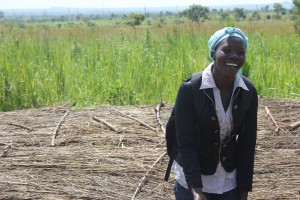 In the future, I want to farm commercially. I want to have a diversity of enterprises. Right now I have some perennials, I have some fruit trees, I have field crops, and I plan to integrate vegetables, so I want to have actually a diversity of enterprises. And soon I want to buy some animals. At the moment I am still using people’s labour in terms of hiring tractors and ox-ploughs. But already I have brought my own plough. So this December I am planning to buy the ox animals so that I do not have to continue hiring and keep more of the profits.
In the future, I want to farm commercially. I want to have a diversity of enterprises. Right now I have some perennials, I have some fruit trees, I have field crops, and I plan to integrate vegetables, so I want to have actually a diversity of enterprises. And soon I want to buy some animals. At the moment I am still using people’s labour in terms of hiring tractors and ox-ploughs. But already I have brought my own plough. So this December I am planning to buy the ox animals so that I do not have to continue hiring and keep more of the profits.
I am very much happy with the role that agriculture plays in my life. Agriculture provides a source of food for myself, my home and income generation. In Uganda, as a whole, agriculture plays a vital role and is the backbone of the country.
Posted in News |
Tagged Acholi, African Revival, Gulu, School Development, School garden, Uganda |
Leave a comment
Posted on September 18, 2015 by Elaine Miller
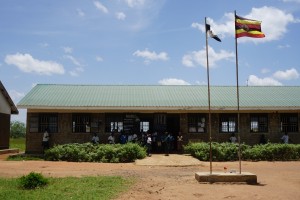 Our Education Jumpstart! team is currently busy conducting Centre Development
Our Education Jumpstart! team is currently busy conducting Centre Development
Plan workshops, in which CMC (Centre Management Committee) members, PTA
(Parents-Teacher-Association) members, SMC (School Management Committees) members and caregivers are trained in developing a Centre Development Plan (CDP) for
their ECD centre. Last week, a two-days workshop was held at St Kizito Bidati Nursery School. With all parties attending, there were 10 enthusiastic and willing ‘learners’, eager to develop a 3-year-plan with one main goal: Quality Education!
The workshop followed three clearly defined objectives:
- Understand planning in the context of Centre Development Plan
- Identify areas that can be considered in that plan
- Understand the steps involved in the development plan
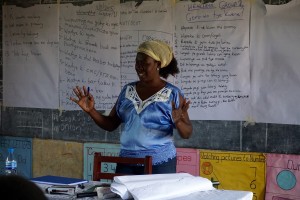 The key word for these workshops is empowerment: We help and guide them through the process of developing their Centre Management Plan by giving them incentives, asking questions and providing some constructive assistance when needed – but it is our participants that come up with concrete ideas which will then translate into their own, individual, customised Centre Development Plan! Right from the start, it is especially important to our Education Programme Coordinator Richard for everyone to realise how quality education can be achieved:
The key word for these workshops is empowerment: We help and guide them through the process of developing their Centre Management Plan by giving them incentives, asking questions and providing some constructive assistance when needed – but it is our participants that come up with concrete ideas which will then translate into their own, individual, customised Centre Development Plan! Right from the start, it is especially important to our Education Programme Coordinator Richard for everyone to realise how quality education can be achieved:
“A lot of school development plans focus on improving infrastructure. However, that doesn’t always have to translate into quality education! Teachers, for example, are much more essential – whatever you invest in their training and development will provide quality education!”
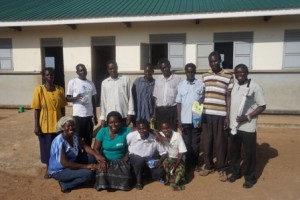 The participants at St Kizito Bidati quickly understood that quality education can only be achieved through a multifaceted approach. This is why, on DAY I, they identified four key areas which their CDP shall focus on: First of all, special emphasis shall be put on (1) ‘Curriculum delivery’ – This means it’s all about the teachers, their training, refresher workshops and adequate materials, but also their motivation from the parents. Here, Julius, a CMC member, stresses
The participants at St Kizito Bidati quickly understood that quality education can only be achieved through a multifaceted approach. This is why, on DAY I, they identified four key areas which their CDP shall focus on: First of all, special emphasis shall be put on (1) ‘Curriculum delivery’ – This means it’s all about the teachers, their training, refresher workshops and adequate materials, but also their motivation from the parents. Here, Julius, a CMC member, stresses
“If you motivate the teachers, they will love your children more. If you care about this, about the teachers, they will have a set mind, they will care about a only your children, not worry about anything else.”
 The second key area is (2) ‘Child-friendly learning environment’. The main focus will be ‘Creating a talking classroom’. This will involve investing in resources, so that at the end of the day, the classrooms are talking for themselves. However, an eye shall also be put on improving outside playing materials and providing enough shade for the children to play outside. Additionally, ensuring a clean and safe environment as well as a clean water source are also part and parcel of this key area. Thirdly, ‘school infrastructure’ (3) shall be improved through, for example, the construction of a bathing facility. Last but not least, boosting (4) ‘parental involvement’ is the fourth key area identified. They are aiming at sensitising parents on the value of ECD through events such as Parents Open Days. Additionally, they came up with another great idea to raise awareness about the importance of ECD: In Uganda, elections are coming up next May and local leaders have already been busy campaigning; the people from Bidati will try to convince some of these local leaders to include ECD in their manifestos! Parental involvement is a key issue for a sustainable change at every school, and at St Kitizito Bidati. This was also evident when looking at development partners and stakeholders. In this respect, as much as the support by NGOs is extremely valuable in these communities, it is decisive to look at them as an additional source of funding that can contribute to areas where parents lack sufficient funding.
The second key area is (2) ‘Child-friendly learning environment’. The main focus will be ‘Creating a talking classroom’. This will involve investing in resources, so that at the end of the day, the classrooms are talking for themselves. However, an eye shall also be put on improving outside playing materials and providing enough shade for the children to play outside. Additionally, ensuring a clean and safe environment as well as a clean water source are also part and parcel of this key area. Thirdly, ‘school infrastructure’ (3) shall be improved through, for example, the construction of a bathing facility. Last but not least, boosting (4) ‘parental involvement’ is the fourth key area identified. They are aiming at sensitising parents on the value of ECD through events such as Parents Open Days. Additionally, they came up with another great idea to raise awareness about the importance of ECD: In Uganda, elections are coming up next May and local leaders have already been busy campaigning; the people from Bidati will try to convince some of these local leaders to include ECD in their manifestos! Parental involvement is a key issue for a sustainable change at every school, and at St Kitizito Bidati. This was also evident when looking at development partners and stakeholders. In this respect, as much as the support by NGOs is extremely valuable in these communities, it is decisive to look at them as an additional source of funding that can contribute to areas where parents lack sufficient funding.
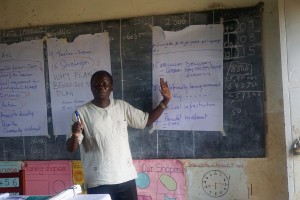 On DAY II, they were ready to get into the details and started off with a SWOT/SCOT (Strengths, Weaknesses/Challenges, Opportunities, Threats) analysis of their school. This is done for specific purpose:
On DAY II, they were ready to get into the details and started off with a SWOT/SCOT (Strengths, Weaknesses/Challenges, Opportunities, Threats) analysis of their school. This is done for specific purpose:
“We want them to see everything in order to make them aware of what is going on how they can use their opportunities to erase their weakness & strengths.”(Richard)
As the ECD centre is only in its nascent stage, it is faced with several challenges andweaknesses, ranging from a lack of classroom, bathing facilities, shades and playing and learning material to high rates of absenteeism in rainy and harvest seasons and rather low 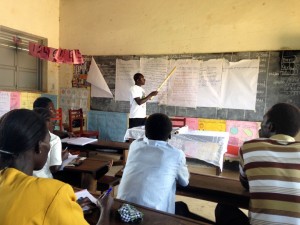 parental involvement. And poverty continues to plague the communities in the region, ultimately representing a threat to the mere maintenance of the nursery. However, they hope to tackle these issues by drawing on their strengths, such as dedicated and qualified teachers, committed CMC members, good enrolment and valuable support of the primary section, and exploiting their ‘opportunities’, may it be through cultivating bare school land for meals for the children or bringing more parents as well as children on board through greater community sensitisation.
parental involvement. And poverty continues to plague the communities in the region, ultimately representing a threat to the mere maintenance of the nursery. However, they hope to tackle these issues by drawing on their strengths, such as dedicated and qualified teachers, committed CMC members, good enrolment and valuable support of the primary section, and exploiting their ‘opportunities’, may it be through cultivating bare school land for meals for the children or bringing more parents as well as children on board through greater community sensitisation.
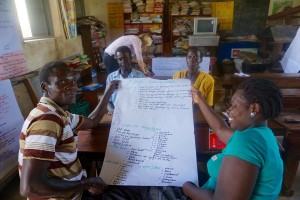 Before everyone was off for the weekend, they started to get to the details, having a look at what resources and expenses will be necessary in order to implement their CDP. Participants were split up into groups. Coincidentally, their results perfectly complemented each other: While the first focused much more on the construction aspect of the SDP, the second prioritised on resources needed inside the classrooms. And once again, they agree on the importance of investing in teacher training. Additionally, their realistic mind-set and awareness of their limited resources inspires them to think practically. For example, when it comes to their constructions plans, they also consider local grass-thatched houses as an alternative.
Before everyone was off for the weekend, they started to get to the details, having a look at what resources and expenses will be necessary in order to implement their CDP. Participants were split up into groups. Coincidentally, their results perfectly complemented each other: While the first focused much more on the construction aspect of the SDP, the second prioritised on resources needed inside the classrooms. And once again, they agree on the importance of investing in teacher training. Additionally, their realistic mind-set and awareness of their limited resources inspires them to think practically. For example, when it comes to their constructions plans, they also consider local grass-thatched houses as an alternative.
The common goal of everyone involved inspires great teamwork and contribution – when Denis, one of the caregivers, addresses the issue of the provision of midday meal by parents, he makes quite a bold move, saying:
“Sometimes you give your children a meal, but you forget about the teachers.”
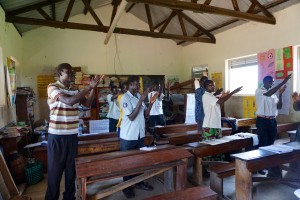 – But the cheekiness is met with great generosity by the attending parents, as they offer to supply the teachers with some land as well as support in the preparation of the land. Filled with motivating appreciation claps for their work, the two-days workshop at St Kizito Bidati ECD centre passed quickly and they look forward to the next workshop, eager to set their CMP into stone.
– But the cheekiness is met with great generosity by the attending parents, as they offer to supply the teachers with some land as well as support in the preparation of the land. Filled with motivating appreciation claps for their work, the two-days workshop at St Kizito Bidati ECD centre passed quickly and they look forward to the next workshop, eager to set their CMP into stone.
From the perspectives of the ‘Juliuses’
Following the workshop, we had the opportunity to talk to a PTA and CMC member who are both called Julius. Find out more about them in the following paragraphs!
Julius #1 – PTA member
We had the opportunity to chat to Julius, a farmer and PTA member at St Kizito Bidati. Four of his five children have already left primary school, but Moses, his youngest, remains and additionally, two of his grandsons, Patience and Emmanuel, from his oldest son, Walter, are currently in K3. Last year, Julius was selected as a PTA member by the community – a position that he has appreciated so far:
“I like it, because I am part of the school, it makes me part of the school. I know how learning is taken place; and above all, my child are also here.”
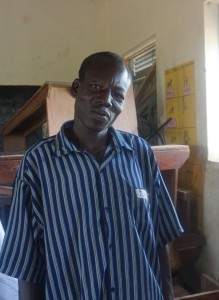 Here is an extract of our feedback-chat:
Here is an extract of our feedback-chat:
What do you think about the performance of the school ?
The school is doing well, but there are certain things that need to be improved on – mostly the parents, who are not doing their part. What do you think of ECD? I am very positive about the ECD, because that is the foundation, for this school to succeed, although there are still challenges with them; there are a few things to be done with the ECD to have that quality.
What do you think of the Jumpstart! project?
For me, the Jumpstart! project is really good, it’s coming to complement what parents are trying to do.
What is best about it?
What I like most about this is the caregivers training, and refresher coursers, the way that teachers are being developed in their skills and are improving each time, because the teachers have demonstrated what they were like before and what they are now. And we, as the management, we were very happy about that. And I think, the impact will go to the children.
What do you think of the workshop?
This workshop is very good. And it wasn’t there before. No one was thinking about it. I now understand the planning – it gives people the opportunity to know what they are supposed to be doing. And I was interested to know more of the different roles of the stakeholders. And I was requesting that such support, if possible, should continue to the leadership of the school, to the management, because it would help them do their work well.
What’s the most important part for you to implement in the CDP?
For me, curriculum delivery is the most important, as well as supporting the teachers, their training and providing the learning materials.
What do you hope for the school?
My hope for this school is to have more caregivers; at least two per class, and this will improve the quality of teaching.
Julius #2 – CMC member
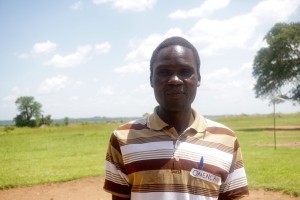 Meet Julius, a 36 year-old farmer from Bidati village in Nyowa district, father of Jacob, Prosie and Fiona, and dedicated member of St.Kitizo Bidati School Central Management Committee ! He was one of the attendees at the two-day Jumpstart! training workshop about developing a Centre Development Plan.
Meet Julius, a 36 year-old farmer from Bidati village in Nyowa district, father of Jacob, Prosie and Fiona, and dedicated member of St.Kitizo Bidati School Central Management Committee ! He was one of the attendees at the two-day Jumpstart! training workshop about developing a Centre Development Plan.
The most important thing that Julius learnt at the training is the importance of planning:
“before the training, the committee was motivated, but not so organised because there was no plan. Now we know who should do what at which time because in the plan everything is detailed – timeframe, goals, responsables, activities. And we are not stopping here – we will meet with other parents to communicate this knowledge.”
Learning how to create action plans has formalised the way the committee works, making them more efficient and productive. Julius is positive that with these new skills, the committee can encourage parents to unite to support the progress of the school.
In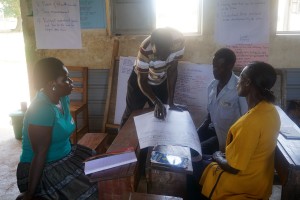 deed, Julius wants to form a committee plan that will raise the standard of education at nursery level, ultimately increasing the quality of teaching and learning and contributing to early childhood development. His belief in the importance of nursery education is based on his own experience as a parent. While his two daughters attended nursery school, his son Jacob did not. The two girls excel at school (Fiona is 1st in her class), often receiving certificates praising their academic performance and organisational skills. However Jacob struggles at school, and has little interest in completing his homework. Julius attributes the educational success of his daughters to their nursery education, which he says helped them to build basic skills and confidence before entering primary level.
deed, Julius wants to form a committee plan that will raise the standard of education at nursery level, ultimately increasing the quality of teaching and learning and contributing to early childhood development. His belief in the importance of nursery education is based on his own experience as a parent. While his two daughters attended nursery school, his son Jacob did not. The two girls excel at school (Fiona is 1st in her class), often receiving certificates praising their academic performance and organisational skills. However Jacob struggles at school, and has little interest in completing his homework. Julius attributes the educational success of his daughters to their nursery education, which he says helped them to build basic skills and confidence before entering primary level.
However, we think that Julius’s dedication to his children’s education has also contributed to this success. He keeps a close eye on his children’s progress both at school and at home, attending ‘lesson day’ each term, a time for parents to attend classes with their children, observe the work scheme and discuss the curriculem with the teachers. Julius regrets leaving school at a young age, so he really values lesson day;
‘I always want to attend, rather than my wife, and sometimes I ask to be set assignments with the children !”
Now that’s dedication ! In the future, he hopes that his children will study hard, but above all “be self-respecting individuals, with careers of their own, who value their jobs”. And he will also do his best to improve the quality of nursery education at Kizito Bidati so that all the students can grow as individuals and have successful careers.
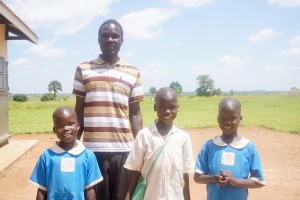
Posted in News |
Tagged Africa, African Revival, ECD, Education, Interview, Nursery, Profile, Pupils, School, School Development, Uganda |
Leave a comment
 African Revival recently organised a 3- day phonics training for Koch Goma Primary School with phonics trainers Jody Spencer and Akello Catherine. Jody and Catherine used the Fun of Phonics curriculum, which has been adapted by Jody from international phonics programmes to fit the local teaching environment in Uganda. Teachers were trained in a multisensory synthetics phonics approach using actions and song, and practiced using teaching methods such as pair reading.
African Revival recently organised a 3- day phonics training for Koch Goma Primary School with phonics trainers Jody Spencer and Akello Catherine. Jody and Catherine used the Fun of Phonics curriculum, which has been adapted by Jody from international phonics programmes to fit the local teaching environment in Uganda. Teachers were trained in a multisensory synthetics phonics approach using actions and song, and practiced using teaching methods such as pair reading. What are literacy levels in Uganda?
What are literacy levels in Uganda? How can training teachers in phonics help improve literacy levels?
How can training teachers in phonics help improve literacy levels?




































 parental involvement. And poverty continues to plague the communities in the region, ultimately representing a threat to the mere maintenance of the nursery. However, they hope to tackle these issues by drawing on their strengths, such as dedicated and qualified teachers, committed CMC members, good enrolment and valuable support of the primary section, and exploiting their ‘opportunities’, may it be through cultivating bare school land for meals for the children or bringing more parents as well as children on board through greater community sensitisation.
parental involvement. And poverty continues to plague the communities in the region, ultimately representing a threat to the mere maintenance of the nursery. However, they hope to tackle these issues by drawing on their strengths, such as dedicated and qualified teachers, committed CMC members, good enrolment and valuable support of the primary section, and exploiting their ‘opportunities’, may it be through cultivating bare school land for meals for the children or bringing more parents as well as children on board through greater community sensitisation.


 Meet Julius, a 36 year-old farmer from Bidati village in Nyowa district, father of Jacob, Prosie and Fiona, and dedicated member of St.Kitizo Bidati School Central Management Committee ! He was one of the attendees at the two-day Jumpstart! training workshop about developing a Centre Development Plan.
Meet Julius, a 36 year-old farmer from Bidati village in Nyowa district, father of Jacob, Prosie and Fiona, and dedicated member of St.Kitizo Bidati School Central Management Committee ! He was one of the attendees at the two-day Jumpstart! training workshop about developing a Centre Development Plan.
